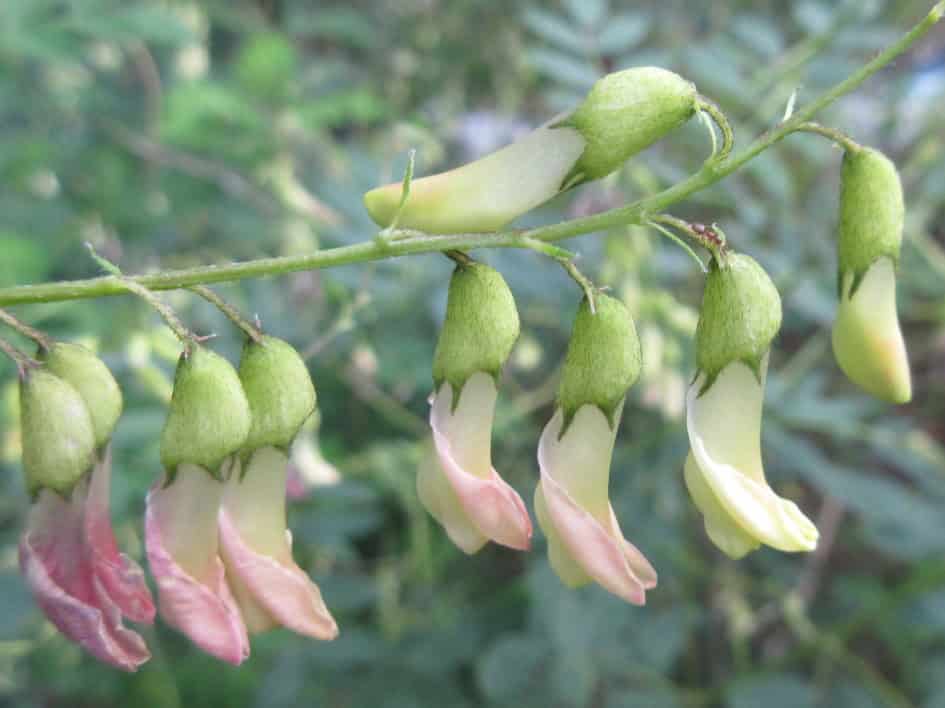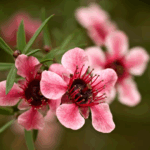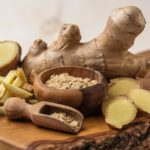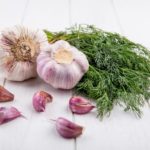
Caren Chen
(MMedSc, MACM, RWMC)
While Astragalus has been used in the East for a very long time now, it has only started gaining popularity in Western countries in the last couple of decades.
Some of the health benefits of Astragalus are:
- providing support to the immune system
- providing support to the cardiovascular system
- exhibiting potent antioxidant activity
- providing support to management of diabetes
If you are interested in these health benefits, and a few others that we cover in the article, we suggest taking a few minutes to read the full article.
Introduction
Astragalus, known in traditional Chinese medicine as Huang Qi, is a perennial plant native to the northern and eastern regions of China, as well as Mongolia and Korea.
This herb has been used in traditional Chinese medicine for centuries. The root of the plant is the part most used in medicinal preparations.
Astragalus is often used in combination with other herbs to enhance its effects.
Other names
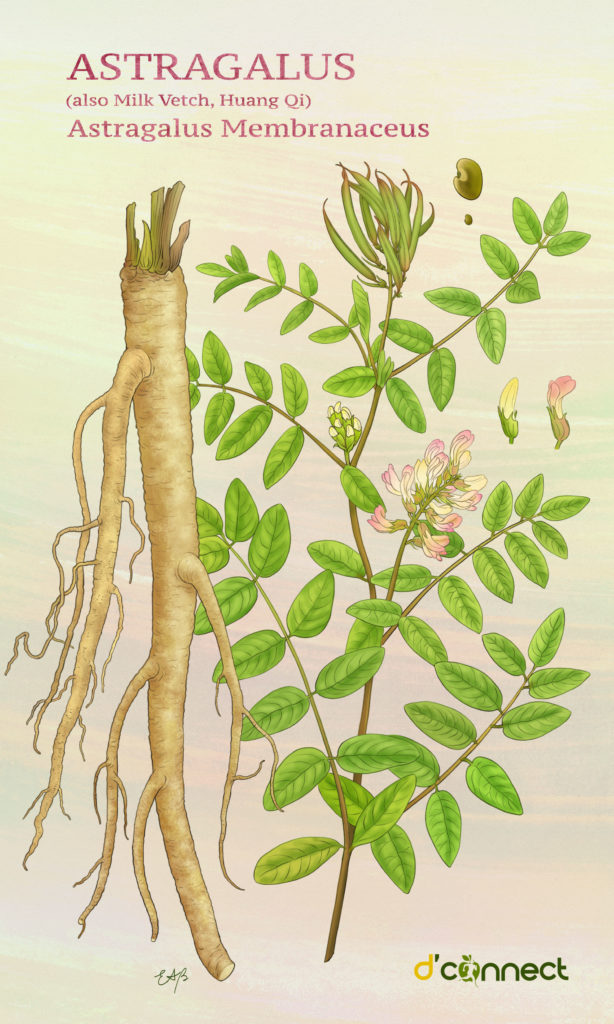
- Astragalus membranaceus (scientific).
- Huang Qi (Chinese).
- Milkvetch.
Characteristics
Astragalus is a perennial plant, about 16 to 36 inches tall. It has hairy stems with leaves made up of 12 to 18 pairs of leaflets.[1]
The root is the medicinal part of the plant and is usually harvested from 4-year-old plants.
Use
Traditional use
Astragalus is used to protect and support the immune system, preventing colds and upper respiratory infections. It is also used to assist with:
- fatigue
- diabetes
- kidney function
- uterine prolapse
- myasthenia gravis
Astragalus has been used for centuries in traditional Chinese medicine in combination with other herbs. Its root is used for health care purposes.
Commonly combined with other herbs, astragalus has been promoted as a dietary supplement for many conditions, which also includes topical application that seems to promote blood flow and speeding wound healing.
Medicinal use
Astragalus has antibacterial and anti-inflammatory properties, and has been used for the following conditions:
- Anemia
Some studies suggested astragalus may improve blood counts in people with aplastic anemia.[2]
- Colds and influenza
In traditional Chinese medicine, astragalus is used as part of an herbal combination to prevent or treat colds.[3]
- Diabetes
Astragalus appears to lower blood sugar.[4]
- Fatigue
Some studies suggest astragalus may help with chronic fatigue, and reduce side effects from chemotherapy.[5]
- Heart disease
Astragalus may act as an antioxidant and help treat heart disease.[6]
- Kidney disease
Astragalus may help protect the kidneys and help treat kidney disease.[7]
- Uterine prolapse
Some studies showed that astragalus may reduce symptoms of patients with uterine prolapse and increase muscle potential.[8]
- Myasthenia gravis
- Astragalus may improve immune function and muscle in patients with myasthenia gravis.[9]
Health benefits
Among the many health benefits of astragalus root is its ability to strengthen the immune system, which helps fend against diseases and infections.
Because of its anti-inflammatory qualities, it can help treat inflammatory diseases and ailments like arthritis. Due to its antioxidant properties, it helps prolong life and prevent cell damage from free radicals.
By regulating healthy levels of blood pressure and cholesterol, and boosting cardiovascular function, astragalus may help heart health.
Additionally, it promotes respiratory health by easing the symptoms of bronchitis and asthma and offers anti-aging advantages by enhancing skin health and possibly delaying the aging process.
Astragalus may assist with cardiovascular health
Immune system support
One of the most well-known benefits of astragalus is its ability to support the immune system. The herb contains compounds such as polysaccharides, saponins, and flavonoids.
These compounds are believed to stimulate the immune system by increasing the activity of white blood cells, which play a crucial role in fighting infections.
Studies found that astragalus polysaccharides enhanced the immune response by promoting the proliferation and activation of T-cells, a type of white blood cell involved in immune defense.[10]
A study demonstrated that astragalus polysaccharides can promote the activities of:
- macrophages
- dendritic cells
- natural killer cells
- T lymphocytes
- B lymphocytes
and induce the expression of a variety of cytokines and chemokines.[11]
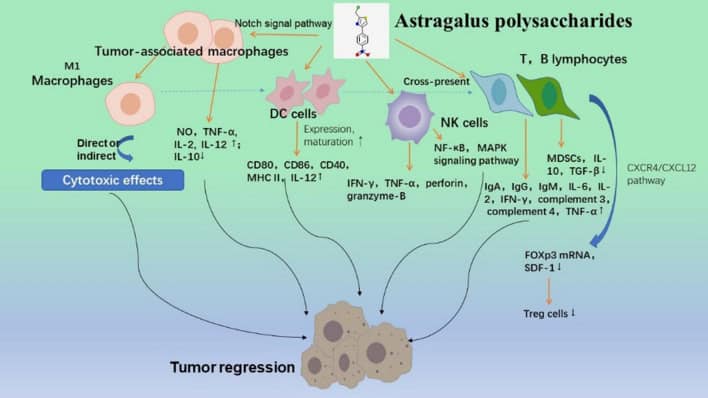
Additionally, astragalus may have a synergistic effect when used in combination with other immune-boosting herbs.
A systematic review highlighted that herbal formulas containing astragalus, when used in conjunction with conventional treatments, significantly improved immune function in patients undergoing chemotherapy, which is known to suppress the immune system.
The results showed that patients who received both oxaliplatin and traditional medicine had 35% less nausea and vomiting compared to those who only received oxaliplatin, even when conventional anti-nausea medications were used.[12]
Anti-inflammatory properties
Astragalus has been studied for its anti-inflammatory effects. It may help reduce inflammation by inhibiting certain inflammatory pathways in the body. This could be beneficial for conditions characterised by chronic inflammation, such as arthritis.
For instance, a study demonstrated the significant role of Astragalus polysaccharides (APS) in the treatment of anti-NMDAR encephalitis, as it effectively suppresses inflammatory cytokines.
These results suggest that APS may regulate key inflammatory markers like IL-1β, TNF-α, and IL-6, which could make it a useful option for managing this condition. APS has the potential to be considered as a viable herbal medication for the treatment of anti-NMDAR encephalitis.[13]
Another study indicated that the total flavonoids of astragalus (TFA) (25, 50, and 100 mg/kg for 28 days) significantly reduced:
- joint swelling
- inflammation
- tissue damage
in rats with arthritis.
It worked by lowering harmful inflammatory substances and protecting joints, suggesting potential benefits for arthritis management.[14]
Cardiovascular health
Research showed that Astragaloside IV (AS-IV) could protect against myocardial ischemia, regulate sarcoplasmic reticulum Ca2+ pump, promote angiogenesis, improve energy metabolism, inhibit cardiac hypertrophy and fibrosis and reduce myocardial cell apoptosis, which may act as a potential therapeutic drug in the clinical treatment of heart failure.[15]
Survival rates of rats after acute myocardial infarction (AMI) improved 73.3% in the AS-IV treatment.[16]

A: Kaplan-Meier analysis indicated the survival rates of the rats after AMI (acute myocardial infarction). The combination treatment group exhibited a trend towards improved overall survival rate 2 weeks after the induction of AMI, but differences did not reach statistical significance (log-rank: P=0.0638).
B: Analysis of the heart weight/body weight ratio, data are expressed as the mean ± SD. **: P<0.01 versus sham group, ##: P<0.01 versus model group, $: P<0.05 versus combined treatment group.
RIC = Remote ischemic conditioning AS-IV = Astragaloside IV
Astragalus may help improve heart function
Another study showed that Astragalus injection dramatically reduced inflammation in patients with viral myocarditis. It lowered levels of inflammatory markers like TNF-α, IL-6, IL-17, CRP, and others while improving the overall effectiveness of treatment.[17]
Antioxidant activity
Astragalus contains antioxidants that help neutralise free radicals in the body. Free radicals are unstable molecules that can cause cellular damage and contribute to aging and various diseases.
A study found that astragalus provided significant protection against injuries of:
- heart
- brain
- kidney
- intestine
- liver
- lung
in various models of oxidative stress-related disease. It also displayed significant prevention of tissue injury via antioxidant mechanisms.[18]
Astragalus membranaceus and its active constituents, which have demonstrated their potential to alleviate and treat inflammatory bowel disease (IBD).
These underlying mechanisms are associated with anti-inflammation, anti-oxidation, immunomodulation, intestinal epithelial repair, gut microbiota homeostasis, and improved energy metabolism.[19]
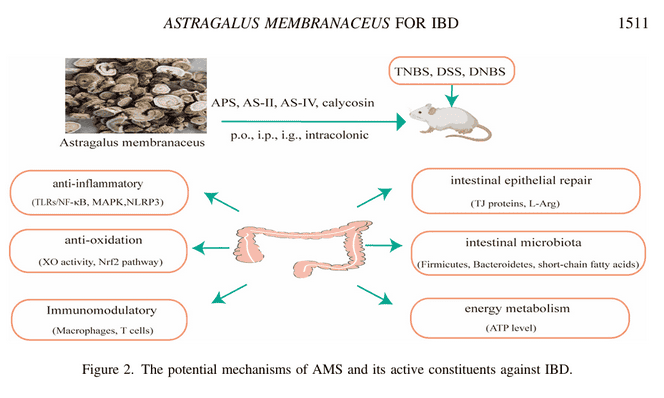
Anti-aging benefits
Astragalus also exhibits properties of anti-aging benefits. Study suggested that the mechanism might be related to the improvement of brain function and immunomodulatory effects.
AST treatment (40 mg/kg/day for 10 weeks) significantly improved motor coordination and memory retention in aged mice, as shown by increased rotating rod performance time and step-down latency, and notably enhanced immune function by increasing splenocyte proliferation and IL-2 production.[20]
Some plants that are effective UV filters may be potential sunscreen ingredients. These include plant extracts such as Astragalus gombiformis with an SPF value of 38.[21]
Diabetes management
Astragalus may have a role in managing diabetes. It may also:
- regulate blood sugar levels
- reduce urinary protein
- improve renal functions
- restrain renal functions damage caused by high glucose
Pathological analysis and study showed that diabetes caused kidney damage, including dilated renal tubules, cell shrinkage, glycogen buildup, and inflammation.
After treatment, the Astragalus membranaceus-Angelica sinensis (AM-AS) compound improved kidney structure.
Astragalus is protective against damage done to the body due to diabetes
It also reduced cell damage, glycogen deposits, and inflammation, suggesting it may help protect kidney function and slow the progression of diabetic nephropathy (DN).[22]
Cancer care
Research found that Astragalus membranaceus helps restore T cell function in cancer patients. It can inhibit certain tumor growth, especially macrophage-like and myeloid tumors, and boost immune responses like TNF production and killer cell activation.[23]
A study tested how Astragali radix (AR) affects cancer cell proliferation and showed that AR strongly inhibited gastric cancer cells (AGS), reducing DNA synthesis by 87.33%.
Inhibition rates for other cancer cells like KATOIII (62.36%) and HT29 (22.8%) varied. It slows the growth of gastric cancer cells through cytostatic mechanisms rather than killing them directly.[24]
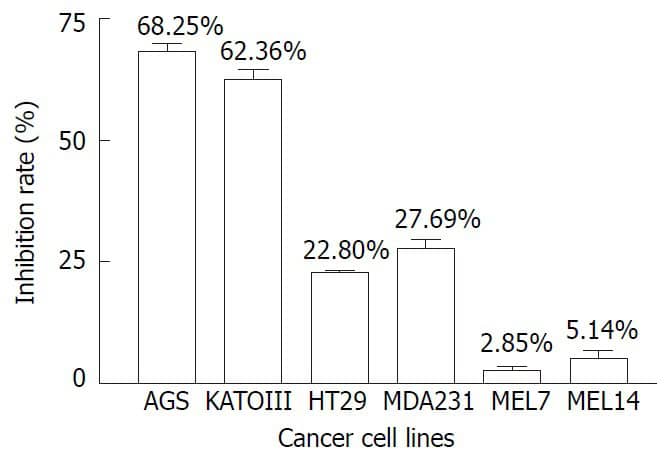
Extracts of Astragali radix have demonstrated anti-tumor effects against:
- lung cancer
- renal cell carcinoma
- bladder cancer
in both clinical trials and animal studies.
Additionally, a traditional Chinese medicine formula based on Astragalus improved the effectiveness and reduced the toxicity of platinum-based chemotherapy in 2,815 patients with advanced non-small-cell lung cancer.[25]
Therapeutic dosage
The therapeutic dosage of Astragalus can vary depending on the specific form of the herb and the intended use. Consult with a qualified Chinese medicine practitioner.
Astragalus root may be available in a variety of forms:
- dried Astragalus root or granule form
- capsules and tablets
- injectable forms for use in hospital or clinical settings in Asian countries
Safety concerns
Astragalus can generally be used safely. Astragalus roots less harmful side effects are often minor and can include:
- Digestive problems (bloating, stomach discomfort, or mild diarrhea)
- Allergy reactions (people who are allergic to Astragalus or related plants may have skin rashes or irritation)
- Fatigue (a small amount of fatigue may occur in some users)
- Nasal symptoms (runny nose or nasal congestion)
If you are pregnant or breastfeeding, have an autoimmune disease or are taking immunosuppressant drugs, please consult with a qualified Chinese medicine practitioner.
Possible interaction with medications
Astragalus might lower blood pressure below healthy levels in people taking blood pressure medications.
Astragalus might increase the impact of diuretics.
Astragalus might make it hard for the body to get rid of lithium, so dangerous levels of lithium could build up in people who take both astragalus and lithium.
Possible interaction with herbs and supplements
Commonly combined with other herbs, astragalus has been promoted as a dietary supplement for many conditions, including upper respiratory infections, allergic rhinitis (hay fever), asthma, chronic fatigue syndrome, and chronic kidney disease, among others.
It’s also promoted to strengthen and regulate the immune system. Topical use (application to the skin) of astragalus is promoted for improving blood flow and speeding wound healing.
The review intended to highlight the importance of:
- Garlic (Allium sativum)
- Green tea (Camellia sinensis)
- Ginger (Zingiber officinale)
- Echinacea (E. angustifolia; E. purpurea; E. pallida)
- Black cumin (Nigella sativa)
- Licorice (Glycyrrhiza glabra)
- Astragalus
- St. John’s wort (Hypericum perforatum)
as natural immune boosters concluded that while these plants have obvious health benefits, the interaction between these herbs/botanicals should be well investigated before recommended for their safe use.[26]
Therefore, be careful if you are looking to combine these specific herbs, and first inquire with a naturopath or Traditional Chinese Medicine practitioner.
Summary

Note — feel free to share or download this illustration.
Related Questions
1. Does Astragalus affect sleep?
Astragalus does not typically have a direct effect on sleep.
It is not considered a sedative and is not known to cause drowsiness or promote sleep. However, because it supports the immune system and helps the body adapt to stress, some people may notice improved sleep indirectly as their overall stress levels or fatigue improve.
That said, those who are sensitive to herbs or stimulants may prefer to take it, or use it externally, such as through moxibustion, earlier in the day to avoid any potential interference with sleep.
2. Can Astragalus assist with anxiety?
Astragalus is not commonly used as a primary remedy for anxiety, as it does not have a direct sedative effect.
However, some individuals find the aroma of Astragalus to be calming and refreshing, which may contribute to a sense of relaxation.
More importantly, Astragalus supports the body’s stress response, particularly in cases of chronic fatigue, low immunity, or burnout.
3. Can Astragalus be taken long-term?
Yes, Astragalus is generally considered safe for long-term use, especially when used to support immune function and overall vitality.
However, individuals who are taking immunosuppressant medications, or managing autoimmune conditions should consult with a qualified Traditional Chinese Medicine Practitioner before starting long-term use.
Caren’s educational and professional journey began under poignant circumstances. At the age of 17, she faced the life-altering challenge of both her mother and grandfather being diagnosed with cancer. This deeply personal experience ignited her determination to pursue a career in medicine, driven by a desire to heal and alleviate suffering…
If you would like to learn more about Caren, see Expert: Caren Chen.
References
(1) Fu J, Wang Z, Huang L, Zheng S, Wang D, Chen S, Zhang H, Yang S. (2014). Review of the botanical characteristics, phytochemistry, and pharmacology of Astragalus membranaceus (Huangqi). Phytother Res.
(2) Wang MS, Li J, Di HX, Li ZL, Yang SL, Hou W, Yan JY, Zhao XM. (2007). Clinical study on effect of Astragalus Injection and its immuno-regulation action in treating chronic aplastic anemia. Chin J Integr Med.
(3) Su G, Chen X, Liu Z, Yang L, Zhang L, Stålsby Lundborg C, Wen Z, Guo X, Qin X, Liang J, Liu X. (2016). Oral Astragalus (Huang qi) for preventing frequent episodes of acute respiratory tract infection in children. Cochrane Database Syst Rev. Retrieved from https://pmc.ncbi.nlm.nih.gov/articles/PMC6463872/
(4) Zhang Z, Zhang L, Xu H. (2019). Effect of Astragalus polysaccharide in treatment of diabetes mellitus: a narrative review. J Tradit Chin Med.
(5) Dong J, Wang S, Gui Y, Wang D, Ma X, Hu S, Wang X, Zhang Y, Hou W. (2022). Astragalus membranaceus (Huang Qi) for cancer-related fatigue: A protocol for systematic review and meta-analysis. Medicine (Baltimore). Retrieved from https://journals.lww.com/md-journal/fulltext/2022/01210/astragalus_membranaceus__huang_qi__for.53.aspx
(6) Yang QY, Chen KJ, Lu S, Sun HR. (2012). Research progress on mechanism of action of Radix Astragalus in the treatment of heart failure. Chin J Integr Med.
(7) Zhang HW, Lin ZX, Xu C, Leung C, Chan LS. (2014). Astragalus (a traditional Chinese medicine) for treating chronic kidney disease. Cochrane Database Syst Rev. Retrieved from https://pmc.ncbi.nlm.nih.gov/articles/PMC10589061/
(8) Liu W, He XL, Zhang ZJ. (2022). Influence of Electrical Stimulation Biofeedback Combined with Buzhong Yiqi Decoction on Pelvic Floor Muscle Potential and Disease-related Factors in Patients with Uterine Prolapse. Guangming Journal of Chinese Medicine.
(9) Niu GH, Sun X, Zhang CM. (2009). Effect of compound astragalus recipe on lymphocyte subset, immunoglobulin and complements in patients with myasthenia gravia. Chinese Journal of Integrated Traditional and Western MedicineChinese.
(10) Li X, Qu L, Dong Y, Han L, Liu E, Fang S, Zhang Y, Wang T. (2014). A review of recent research progress on the astragalus genus. Molecules. Retrieved from https://www.mdpi.com/1420-3049/19/11/18850
(11) Xu Q, Cheng W, Wei J, Ou Y, Xiao X, Jia Y. (2023). Synergist for antitumor therapy: Astragalus polysaccharides acting on immune microenvironment. Discov Oncol. Retrieved from https://pmc.ncbi.nlm.nih.gov/articles/PMC10517906/
(12) Chen MH, May BH, Zhou IW, Zhang AL, Xue CC. (2016). Integrative Medicine for Relief of Nausea and Vomiting in the Treatment of Colorectal Cancer Using Oxaliplatin-Based Chemotherapy: A Systematic Review and Meta-Analysis. Phytother Res.
(13) Lu Y, Wu Y, Sun L, Yang S, Kuang H, Li R, Meng Y, Wu Y. (2024). Identifying the Anti-inflammatory Effects of Astragalus Polysaccharides in Anti-N-Methyl-D-Aspartate Receptor Encephalitis: Network Pharmacology and Experimental Validation. Comb Chem High Throughput Screen.
(14) Liu XY, Xu L, Wang Y, Li JX, Zhang Y, Zhang C, Wang SS, Zhang XM. (2017). Protective effects of total flavonoids of Astragalus against adjuvant-induced arthritis in rats by regulating OPG/RANKL/NF-κB pathway. Int Immunopharmacol.
(15) Zang Y, Wan J, Zhang Z, Huang S, Liu X, Zhang W. (2020). An updated role of astragaloside IV in heart failure. Biomed Pharmacother. Retrieved from https://www.sciencedirect.com/science/article/pii/S0753332220302031?via%3Dihub
(16) Cheng S, Yu P, Yang L, Shi H, He A, Chen H, Han J, Xie L, Chen J, Chen X. (2016). Astragaloside IV enhances cardioprotection of remote ischemic conditioning after acute myocardial infarction in rats. Am J Transl Res. Retrieved from https://pmc.ncbi.nlm.nih.gov/articles/PMC5126311/
(17) Guo J, Zhao N, Jin P, Yin Y. (2022). Effect of Astragalus injection on inflammatory mediators in patients with viral myocarditis: A systematic review and meta-analysis. Phytomedicine.
(18) Shahzad M, Shabbir A, Wojcikowski K, Wohlmuth H, Gobe GC. (2016). The Antioxidant Effects of Radix Astragali (Astragalus membranaceus and Related Species) in Protecting Tissues from Injury and Disease. Curr Drug Targets.
(19) Hou M, Leng Y, Shi Y, Tan Z, Min X. (2023). Astragalus membranaceus as a Drug Candidate for Inflammatory Bowel Disease: The Preclinical Evidence. Am J Chin Med.
(20) Lei H, Wang B, Li WP, Yang Y, Zhou AW, Chen MZ. (2003). Anti-aging effect of astragalosides and its mechanism of action. Acta Pharmacol Sin. Retrieved from http://www.chinaphar.com/article/view/9071/9516
(21) Michalak M. (2023). Plant Extracts as Skin Care and Therapeutic Agents. Int J Mol Sci. Retrieved from https://pmc.ncbi.nlm.nih.gov/articles/PMC10607442/pdf/ijms-24-15444.pdf
(22) Dong Y, Zhao Q, Wang Y. (2021). Network pharmacology-based investigation of potential targets of astragalus membranaceous-angelica sinensis compound acting on diabetic nephropathy. Sci Rep. Retrieved from https://pmc.ncbi.nlm.nih.gov/articles/PMC8484574/pdf/41598_2021_Article_98925.pdf
(23) William C.S. Cho, Kwok N. Leung. (2007). In vitro and in vivo anti-tumor effects of Astragalus membranaceus. Cancer Letters.
(24) Lin J, Dong HF, Oppenheim JJ, Howard OM. (2003). Effects of astragali radix on the growth of different cancer cell lines. World J Gastroenterol. Retrieved from https://pmc.ncbi.nlm.nih.gov/articles/PMC4611425/
(25) McCulloch M, See C, Shu XJ, Broffman M, Kramer A, Fan WY, Gao J, Lieb W, Shieh K, Colford JM Jr. (2006). Astragalus-based Chinese herbs and platinum-based chemotherapy for advanced non-small-cell lung cancer: meta-analysis of randomized trials. J Clin Oncol.
(26) Sultan, M. T., Buttxs, M. S., Qayyum, M. M. N., & Suleria, H. A. R. (2014). Immunity: Plants as Effective Mediators. Critical Reviews in Food Science and Nutrition. Retrieved from https://www.tandfonline.com/doi/full/10.1080/10408398.2011.633249?scroll=top&needAccess=true

